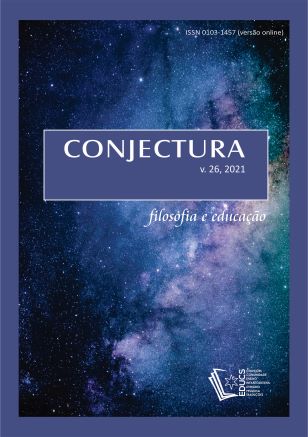Genealogy as the expansion of criticism in Michel Foucault’s thought
DOI:
https://doi.org/10.18226/21784612.v26.e021030Abstract
This article intends to make a temporal / methodological outline in the work of Michel Foucault, based on the theoretical and methodological axes of Archeology and Genealogy and seeks to demonstrate that the passage from one axis to another also means a change in method and research object, however, the archaeological dimension is not set aside, it is, rather, an expansion of criticism, as this remains strong, despite the fact that the type of methodological question changes and the analysis starts to focus, then, on the correlation between power and knowledge. The methodology used for the choice of works referenced in this article was based on the selection of passages, in the set of texts that deal with the topics covered, and that corroborate with the proposed arguments. It also aims to detail the methodological elements of genealogy, presenting its critical potential, based on the understanding that genealogical criticism is local, contingent, provisional; it is an undertaking to liberate historical knowledge; it is necessary to overcome / criticize a tradition that argues that there is only knowing where / when power relations are suspended. Finally, when defining the exercise of power as a mode of action on the action of others, when it characterizes it by the government of men, by one or the other, in the broadest sense of that word, a fundamental element is included: freedom. Power is only exercised over free subjects and as long as they are free – the relationship of power and the freedom of freedom cannot be separated. Genealogy establishes a historical ontology (limited, determined and always liable to start over), what is proposed is an ethos, a philosophical life in which the critique of who we are is the historical analysis of the limits placed on us and the experience of their possible transgression. Life that seeks to promote and shape the impatience of freedom, according to the principle of autonomy.
Keywords: Genealogy. Power. Criticism. Freedom. Michel Foucault.
References
CASTRO, Edgardo. Vocabulário de Foucault. Belo Horizonte: Autêntica Ed., 2009.
FOUCAULT, Michel. A ordem do discurso. São Paulo: Ed. Loyola, 1996.
_____. História da sexualidade 1: A vontade de Saber. Rio de Janeiro: Ed. Graal, 1988.
_____. História da sexualidade 2: O uso dos prazeres. Rio de janeiro: Ed. Graal, 4.ed, 1985.
_____. Nietzsche, a Genealogia, a História. In: _____. Ditos e escritos II – arqueologia das ciências e história dos sistemas de pensamento. Rio de Janeiro: Forense Universitária, 2004, pp.260-281.
_____. O que são as luzes? In: _____. Ditos e escritos II – arqueologia das ciências e história dos sistemas de pensamento. Rio de Janeiro: Forense Universitária, 2004b, pp.335-351.
_____. O sujeito e o poder. In: DREYFUS, H; RABINOW, P. Michel Foucault uma trajetória filosófica: Para além do estruturalismo e da hermenêutica. Rio de Janeiro: Forense Universitária, 2010. pp.289-347
_____. Polêmica, Política e Problematizações. In: _____. Ditos e escritos V: ética, sexualidade, política. Rio de janeiro: Forense Universitária, 2004a.
HINDESS, B. Discourses of power: from Hobbes to Foucault. Massachusetts: Blackwell Publishers, 2013.
KANT, Immanuel. Resposta à pergunta: Que é o Iluminismo? In: _____. A paz perpétua e outros opúsculos. Lisboa: Edições 70, 1988.
OLIVEIRA, Nythamar Fernandes de. Tractatus ethico-politicus: genealogia do ethos moderno. Porto Alegre: Edipucrs, 1999.
RAJCHMAN, John. Foucault: a liberdade da filosofia. Rio de Janeiro: Jorge Zahar, 1987.
REVEL, Judith. Dicionário Foucault. Trad. de Anderson Alexandre da Silva. Rio de Janeiro: Forense Universitária, 2011.
Downloads
Published
How to Cite
Issue
Section
License
1. The publication of the originals will imply the assignment of copyright to Conjectura Journal.
2. Texts cannot be reproduced without authorization from the Journal after acceptance.









